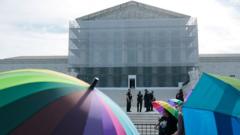Can Parents Now Opt Out of Lessons Featuring LGBT Books?

Understanding the Recent Supreme Court Ruling on LGBTQ Themes in Education
The recent ruling by the U.S. Supreme Court has sparked significant debate and reflection on the intersection of education, parental rights, and LGBTQ representation in schools. In a landmark decision, the court sided with a group of parents in Maryland who sought to opt their children out of reading materials that feature LGBTQ themes. This ruling, which came down with a 6-3 vote, has raised important questions about the balance between religious freedoms and educational inclusivity. As the implications of this decision unfold, it is crucial to understand the context, arguments, and potential ramifications for public education across the United States.
The Context of the Case
The case originated in Montgomery County, Maryland, where the local school board adopted a curriculum in 2022 that included children's books with LGBTQ themes. Among the titles were "Uncle Bobby's Wedding," which narrates the story of a girl learning about her uncle's same-sex wedding, and "Born Ready: The True Story of a Boy Named Penelope," which tells the journey of a transgender boy. The parents involved in the lawsuit, representing various faiths, argued that being exposed to such themes contradicted their religious beliefs.
The school board's decision to remove the opt-out option for younger students was driven by concerns about classroom disruptions and the potential social stigma faced by LGBTQ students. This action sparked the parents' legal challenge, emphasizing their First Amendment right to freely exercise their religion.
Key Arguments in the Ruling
The Parents' Perspective
The parents argued that the curriculum imposed an unconstitutional burden on their rights to practice their religion freely. They highlighted several key points:
- Right to Religious Freedom: The First Amendment protects individuals from government interference in their religious beliefs, which the parents argued includes the right to withdraw their children from specific educational content.
- Comparison to Sex Education: The parents noted that school policies already allow them to opt older children out of sex education classes, suggesting a precedent for their request.
- Respect for Diversity: While opposing the LGBTQ-themed books, the parents expressed no objection to their availability in school libraries, emphasizing a desire for parental control over their children's exposure to certain topics.
The Court's Majority Opinion
Justice Samuel Alito, writing for the majority, emphasized that the parents demonstrated a strong likelihood of success on the merits of their case. He stated that the lack of an opt-out option placed an unconstitutional burden on their religious exercise. The majority's decision to grant a preliminary injunction was rooted in several factors:
- Likelihood of Success: The court found that the parents had a solid legal basis for their claims, indicating that their case would likely prevail if fully litigated.
- Risk of Irreparable Harm: The justices acknowledged that the parents might suffer significant and irreversible harm if the injunction were not granted.
- Public Interest: The ruling suggested that granting the injunction served the public interest by respecting the diversity of religious beliefs in the community.
The Dissenting Opinion
Justice Sonia Sotomayor, joined by the court's two other liberal justices, dissented from the majority opinion. In her dissent, she raised concerns about the potential chaos this ruling could bring to public schools. She argued that:
- Impact on Public Education: Sotomayor warned that allowing parents to withdraw their children from lessons based on religious beliefs could lead to instability in the educational system.
- Complexity of Beliefs: The diversity of religious beliefs in the U.S. means that many interactions and lessons could conflict with various parents' beliefs, leading to a fragmented educational experience.
The Broader Implications of the Ruling
This Supreme Court decision resonates far beyond Maryland, potentially influencing educational policies and parental rights across the nation. The ruling highlights several broader issues:
1. The Balance of Rights
One of the central themes emerging from this case is the delicate balance between protecting religious freedoms and ensuring that all students receive an inclusive education. Schools often serve as microcosms of society, where diverse beliefs and identities intersect. As such, navigating the rights of parents to guide their children's education while fostering an inclusive environment for all students will continue to be a contentious issue.
2. Educational Curriculum Decisions
The ruling may embolden other parents and groups to challenge curricula that they find objectionable. This could lead to a wave of legal challenges aimed at various educational materials, potentially reshaping what is taught in classrooms nationwide. School boards may find themselves under increased pressure to reconsider their curricular choices in light of parental objections.
3. LGBTQ Representation in Education
Despite the ruling's implications for LGBTQ-themed educational materials, many advocates emphasize the importance of representation in children's literature. Studies have shown that inclusive curricula can foster understanding, empathy, and acceptance among students. The challenge will be finding ways to include diverse voices and experiences while respecting the rights of parents.
4. Future Legal Challenges
This ruling is likely to set a precedent for future cases regarding educational content and parental rights. Legal experts predict that we may see similar cases emerge in other states, as debates surrounding LGBTQ representation in schools continue to unfold. The legal landscape surrounding education, parental rights, and free speech is evolving rapidly, and stakeholders on all sides will need to remain vigilant and engaged.
Conclusion: Navigating a Complex Landscape
The recent Supreme Court ruling in favor of parents seeking to opt their children out of reading LGBTQ-themed books underscores the complexities surrounding education, parental rights, and religious beliefs. As communities grapple with these issues, it is essential to foster open dialogue and seek solutions that respect both parental rights and the need for inclusive education.
As this conversation continues, it is crucial for educators, parents, and policymakers to work collaboratively to create environments that honor diversity while addressing the concerns of all stakeholders. The future of education may depend on our ability to navigate these challenging waters with sensitivity and understanding.
FAQs
What was the Supreme Court's ruling regarding LGBTQ themes in education?
The Supreme Court ruled in favor of parents in Maryland, allowing them to opt their children out of reading materials with LGBTQ themes, citing religious rights under the First Amendment.
Why did the parents challenge the curriculum in Montgomery County?
The parents argued that the inclusion of LGBTQ-themed books violated their religious beliefs and that they should have the right to withdraw their children from such lessons.
What were some books included in the curriculum?
Some notable titles included "Uncle Bobby's Wedding," which discusses a same-sex wedding, and "Born Ready: The True Story of a Boy Named Penelope," which tells the story of a transgender boy.
What were the dissenting opinions from the justices?
Justice Sotomayor and the other dissenting justices expressed concern that the ruling could lead to chaos in public schools and highlighted the complexities of balancing diverse beliefs in education.
As the conversation surrounding education and inclusivity continues, how can communities work together to foster an environment where all students feel represented and respected? #EducationReform #ParentalRights #LGBTQInclusion
Published: 2025-06-27 16:33:03 | Category: wales



